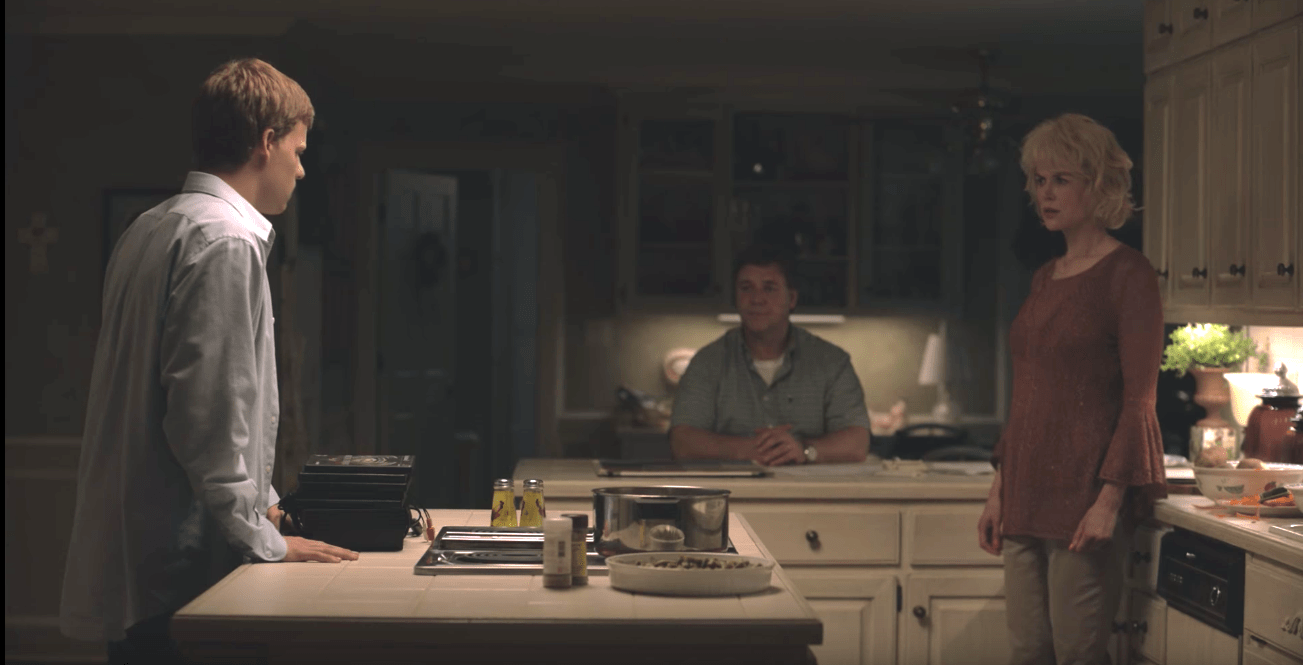
Boy Erased is a film based on the true story of Garrard Eamons (Lucas Hedges), the son of a small-town Baptist pastor Marshall (Russell Crowe), who is struggling with his burgeoning homosexuality and how it squares with the strict Christian values under which he was raised. With Marshall devastated at learning that his son is gay and worried about the effect his son’s sexual orientation may have on his own standing within the church, and his mother Nancy (Nicole Kidman) caught between her love for her son and her faith, Jared is enrolled into a gay conversion therapy program called Love in Action headed by Victor Sykes (Joel Edgerton). While there, both Jared and his family discover a little more about who they are.
What Boy Erased does remarkably well as a film is to thoroughly lay out and display how repression of religious conservatism converges with the burgeoning sexuality of young people raised within that culture to create a highly volatile mix that often threatens their very lives. As the young transition from children to emerging adults, the confusion about their new sexual desires only serves to complicate the accompanying new experiences and feelings of their development. That homosexuality is so verboten in these circles only adds to the stress of what is already a challenging situation. This struggle is what we see in Garrard and the other camp attendees as they are subjected to psychological and physical torture to help them “get better.” From the moment Garrard is checked into the program, we’re made to witness its regressive, warped line of thought that results in inmate-like treatment for its attendees. They’re subjected to submission of their personal effects to camp employees and Sykes who can search through their writings and phones for suspicious content and contacts. Some of the “treatment” the teens are subjected through is a textbook display of stereotypical masculinity; pushups and being forced to take battling practice in front of high-speed pitching machines in order to prove toughness. The repression sparked by this toxic mix manifests in making those targeted by it not just depressed or beaten down, but can also transform them into predators themselves. In one particular tough scene to watch, **trigger warning** Garrard is the victim of a rape attempt by his college roommate who is also a young homosexual forced to beat back his desires as a result of his Christian upbringing. Boy Erased does an excellent job of exploring the many facets and consequences of religious repression from every possible angle.
Kidman, Crowe, and Hedges performances power Boy Erased and serve as the engine that powers the film, establishing the emotional connection between the story and the audience. Kidman specifically shines as a mother caught between a culture that represses not just her son, but her own voice as she comes to realize while trying to support Gerrard through his journey. Nancy’s character arc feels especially relevant as the position and role played by white women in the sociopolitical debates of today are focused upon so much more closely. Through Nancy, we witness the tug and pull of religious conservatism not just on young homosexuals, but women caught between their faith and upbringing, and the human need to be fully respected and heard. Nancy begins the film voiceless and going along to get along with her husband, but comes to realize the culture of which she is part is not only harming her son, but may be harming her as well. Hedges shines as Gerrard, fully encompassing all of the self doubt, confusion, and anger of a teenager trying to find himself amidst an environment that hates who he may be. Gerrard’s experiences in struggling with his identity are at the center of the plot and Hedges does well in ensuring that the audience remains engrossed in the character’s emotional reaction to every experience and challenge. Crowe’s portrayal of a preacher with bigoted beliefs having to confront the fact that his son now embodies everything he’s preached against comes off, unfortunately, very believably. The importance of keeping up appearances as a clergyman, as well as his baseline regressive belief system, is what drives Marshall and the effect his selfishness has on his family serves as the film’s antagonist and Crowe plays it to great effect.
Boy Erased is a film that remains sadly topical not just because of the continued legality and operation of gay conversion programs in states nationwide, but because the proponents of such programs continue to find themselves elected to public office throughout the United States, including Office of the Vice President. Writer/director Joel Edgerton creates a very raw and genuine glimpse into conservative Christian culture and its machinations that may lead to people making decisions that those outside of its grasp may not fully comprehend. Edgerton provides the film with a very voyeuristic quality that feels more like viewers are peeking into a real world than watching a movie. Moving performances from Nicole Kidman and Russell Crowe provide an all too real, devastating look into how something that is supposed to heal and accentuate the love in people’s lives like religion can end up doing the opposite; something so second nature like care for one’s child can be tested and at times over come by faith in institutions. Hedges heartrendingly portrays the conflicted feelings and emotions of trying to reconcile one’s true nature with what their surroundings expect from them and the expectations of those they care for the most. Boy Erased is an engrossing, thought-provoking look into the depths of familial love.
Image: Focus Features

